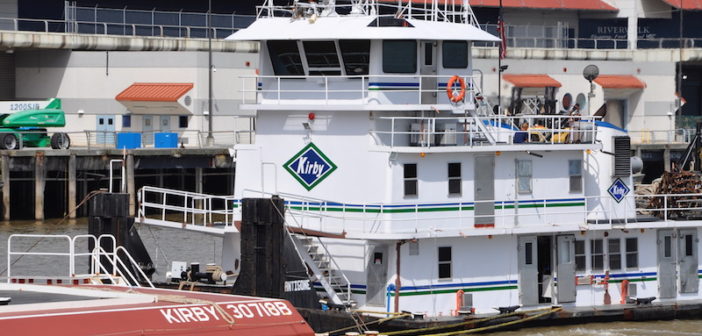Inland tank barge giant Kirby Corp. reported weakened earnings for the third quarter of 2020 on Thursday, citing a dip in demand for services due to the Covid-19 pandemic, numerous devastating storms that disrupted operations in the Gulf, and a drop in activity in the oil patch.
The Houston-based barge line posted $27.4 million net earnings over the third quarter of 2019, a 43% drop compared to $48 million in the same quarter of 2019. Earnings per share were 46 cents during the quarter, compared to 80 cents in 2019. The financials were better than analysts had predicted given the current market, and company officials attribute that to cost cutting and a tax break allowed by a federal pandemic relief law.
Total revenues were posted at $496.6 million compared to $666.8 million during the 2019 third quarter, a 26% drop in business for the company.
The marine transportation sector, where Kirby operates both inland and coastal tank barges, had the weakest performance, down 22%, with total revenues of $320.6 million compared to $412.7 million for the 2019 third quarter. Operating income slipped 55% to $32.4 million.
“The covid-19 pandemic and the associated economic slowdown adversely impacted Kirby’s business during the third quarter,” David Grzebinski, Kirby president and CEO, said in an earnings conference call. “Although general economic activity was slightly improved and increased profitability was realized in the distribution and services segment, the marine transportation business experienced lower volumes and barge utilization.”
Kirby’s inland and coastal barging was deeply impacted by weak demand for liquid products such as refined products, crude and black oil, he said. “Refinery utilization was well below historical norms as many of our customers experienced low consumer demand, high product inventories and unfavorable economics.”
A very active hurricane season that produced multiple damaging storms in the Gulf of Mexico further reduced volumes as refineries, chemical plants, waterways and major ports were closed. This contributed to low barge utilization and limited spot market activity, he added.
Lower refinery and chemical plant activity drove down average inland barge utilization to the low 70% range during this time, compared to the low 90% range in the same period in 2019. Low barge utilization pushed down spot market pricing by 10%, while term contract pricing on expiring contracts was down in the low single digits, Grzebinski said.
In the coastal market, reduced demand for refined products and black oil limited spot market activity and barge utilization dipped to the mid-70% range. Revenues in this segment declined 25% compared to the 2019 third quarter.
In Kirby’s Distribution and Services division, revenues were hurt by low oil prices and reduced oilfield activity that reduced customer demand for engines, pressure pump equipment and parts and service. This pushed down third quarter revenues to $176 million compared to $254.1 million during the 2019 third quarter.
“The last six months have been very challenging times for most everyone including Kirby,” Grzebinski said. “Before Covid-19 shut down economies around the world, Kirby inland marine business recorded some of the strongest barge utilization levels in our history. Activity was very strong.” Contracts were renewing higher, and even oil and gas were showing signs of recovery with the expectation of stronger demand by at the end of the year. “Since then, steep activity declines have occurred across the company.”
The current situation isn’t likely to improve much during the final quarter of the year as the economic recovery has been “slower than any of us would have hoped,” he said, and a second wave of the virus infections could further suppress demand for products Kirby moves. For inland barge business, he expects revenues and operating margins will be “flat to down slightly” in the fourth quarter.
“The risk to and slope of this recovery is highly uncertain. We believe our 4th quarter will be difficult, with results negatively impacted by seasonality and continued low barge utilization,” he said.
Grzebinski also predicted that there will be little new barge construction (Kirby expects to retire a total of 80 barges by year’s end), that navigation delays will continue due to winter weather, and that demand from the oil and gas market will be limited.
But he believes that Kirby’s stagnant activity level has “bottomed out,” and will improve in 2021 as the national and global economies and energy markets recover — assuming that the pandemic is under control.
Grzebinski said Kirby is “in a strong financial position, and we will continue to tightly manage our costs, maintain capital discipline, generate free cash flow and pay down debt.”




